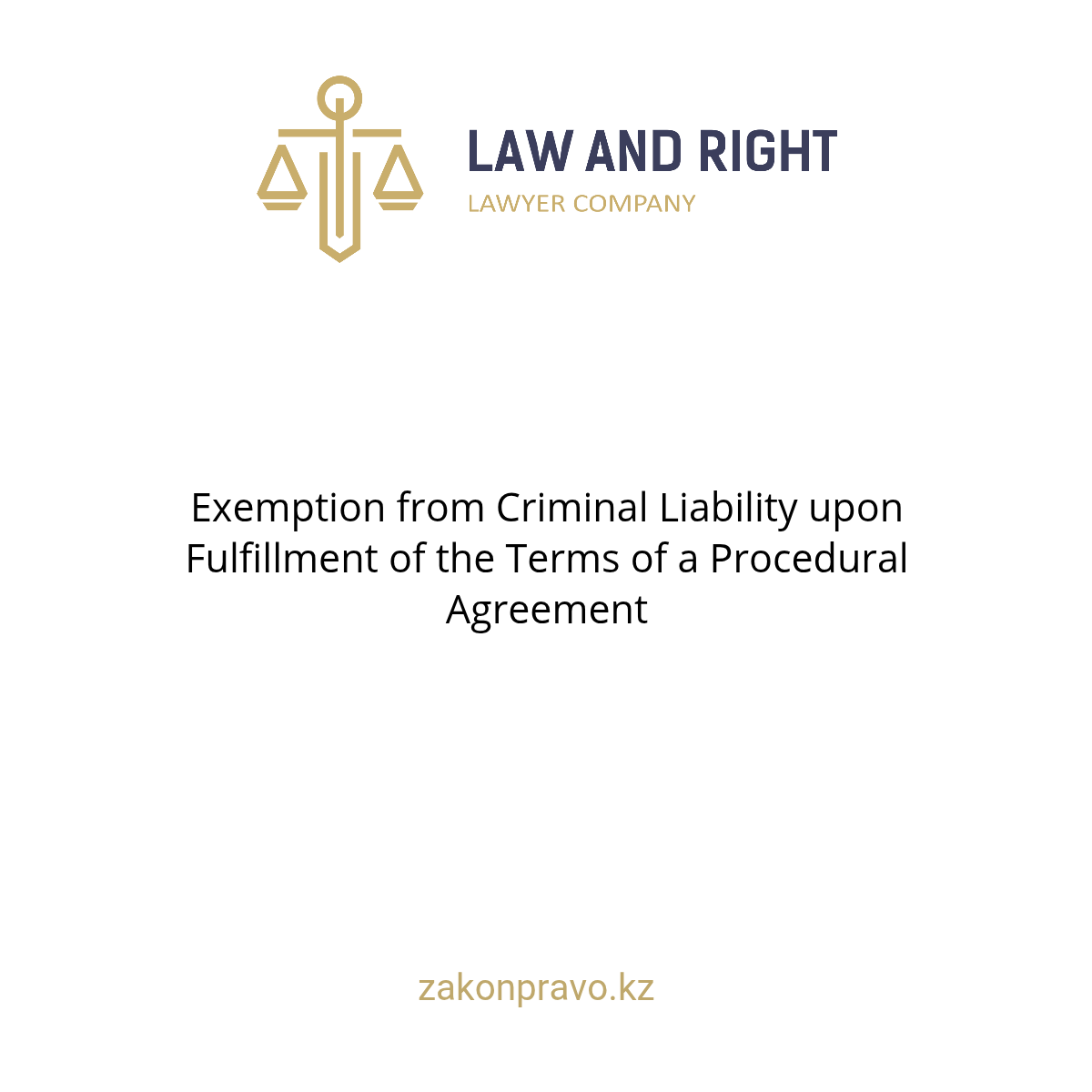Exemption from Criminal Liability upon Fulfillment of the Terms of a Procedural Agreement
🔷 1. General Characteristics of the Article
Article 67 of the Criminal Code of the Republic of Kazakhstan establishes a legal mechanism whereby a person who has entered into and fulfilled the terms of a procedural agreement may be exempted from criminal liability.
🔹 This allows the state to:
· save judicial resources;
· encourage cooperation with investigative authorities;
· ensure compensation to victims;
· reduce the duration and cost of criminal proceedings.
📌 This article works in conjunction with Articles 35, 613–621 of the Criminal Procedure Code of the Republic of Kazakhstan, which regulate the conclusion and implementation of procedural agreements.
🔷 2. Conditions for Application of the Article
📌 Grounds:
The fact of full compliance with all terms of the procedural agreement between:
· the suspect/accused and
· the prosecutor.
📌 Possible terms of the agreement (see Article 35 of the Criminal Procedure Code):
· confession of guilt;
· cooperation in solving crimes;
· compensation for damages to the victim;
· testimony against accomplices and organizers;
· other terms agreed by the parties.
📌 Outcome:
If all conditions are fulfilled, the prosecutor may petition the court, and the court has the right to exempt the person from criminal liability.
🔷 3. Commentary on the Provisions of the Article
🔹 Part 1. Possibility of Exemption
"A person who has fulfilled all the terms of a procedural agreement may be exempted..."
🔸 This is a discretionary power of the court, not an obligation. The court considers:
· the nature of the crime;
· the degree of participation of the person;
· good faith in fulfilling the agreement;
· the personality of the accused and the consequences of the act.
📌 Exemption is granted based on a judicial act, following a motion by the prosecution and confirmation of the fulfillment of the agreement terms.
🔹 Part 2. Restriction: Crimes Against the Sexual Integrity of Minors
"...except in cases where such a crime was committed by a minor against another minor..."
🔹 Persons who committed:
· rape (Article 120),
· lewd acts (Article 124),
· other acts against the sexual integrity of persons under 18 — are not eligible for exemption under Article 67, even if an agreement exists.
🔹 Exception: if a minor (14–17 years old) committed such a crime against another minor (14–17 years old). This reflects a humanistic approach to adolescent behavior.
📌 See also: Articles 66 and 65 of the Criminal Code — similar exceptions are made for minors in other exemption mechanisms.
🔷 4. Judicial Practice
✅ Example 1: Exemption Applied
An accused under Article 189 of the Criminal Code (embezzlement of entrusted property) entered into a plea agreement, voluntarily returned the damages, and testified against accomplices. The court, upon the prosecutor’s motion, exempted him from liability under Article 67.
❌ Example 2: Exemption Denied
An accused charged with violent sexual acts against a minor (Article 121-1 of the Criminal Code) offered a procedural agreement and compensated for the harm. The court denied the exemption: the category of the crime excludes the application of Article 67.
🔷 5. Related Legal Provisions
| Norm | Content |
|---|---|
| Article 35 of the CPC RK | Grounds for termination of proceedings |
| Articles 613–621 of the CPC RK | Procedural agreement (conclusion, execution, judicial review) |
| Article 65 of the CC RK | Exemption due to active repentance |
| Article 70 of the CC RK | Exemption from punishment |
| Law of the RK "On Combating Corruption" | Special aspects of agreements in corruption-related crimes |
🔷 6. International Standards
🔹 UN Convention against Corruption (Articles 37, 39):→ States are encouraged to promote cooperation with judicial authorities, including through agreements and exemption from prosecution.
🔹 European Convention on Human Rights, Article 6:→ Allows termination of prosecution in cases of voluntary and informed confession, while preserving the right to a fair trial.
🔹 Recommendation Rec(2000)19 of the Committee of Ministers of the Council of Europe:→ Encourages the use of agreements and alternatives to punishment to ensure effective justice.
🔷 7. Conclusion
Article 67 of the Criminal Code of the Republic of Kazakhstan is an important mechanism for alternative resolution of criminal cases, whereby:
· the person admits guilt and voluntarily compensates damages;
· the state accepts cooperation as a form of lawful behavior;
· the court decides on liability on a case-by-case basis.
📌 At the same time, the protection of socially significant interests is ensured, especially in cases involving crimes against minors.
Attention!
Law and Law Law Law draws your attention to the fact that this document is basic and does not always meet the requirements of a particular situation. Our lawyers are ready to assist you in legal advice, drawing up any legal document suitable for your situation.
For more information, please contact a Lawyer / Attorney by phone: +7 (708) 971-78-58; +7 (700) 978 5755, +7 (700) 978 5085.
Attorney at Law Almaty Lawyer Legal Services Legal Advice Civil Criminal Administrative Cases Disputes Protection Arbitration Law Firm Kazakhstan Law Office Court Cases


